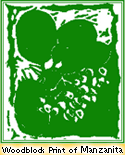

Please check out our new website at YerbaBuenaNursery.com
We are keeping this site alive while we continue to port all of the content over to the new site.
Please note. We are not actively maintaining this site. Prices and inventory are not current or correct.
For correct pricing and inventory, please visit the new site
San Mateo Daily Journal, 01/27/07 issue Eco-tourism blooming By Allison Sundaram
Alex Shonkoff/Daily Journal
Matt Teel, 28, is not only the propagator and manager of the 40-acre Yerba Buena Nursery in Woodside, but also a resident on the property.
The days may be short and cold, but eco-tourism in Half Moon Bay is starting to bloom.
A visitor’s guide and tourist information is already available, retailers have signed on, and a two-day tourism package is being offered by the Half Moon Bay Chamber of Commerce for an eco-tourism weekend in March, which the chamber plans to make quarterly by 2008.
“We’re behind the rest of the world in eco-tourism, and being a native Californian that personally hurts,” said Charise McHugh, president of the Half Moon Bay Chamber of Commerce. “We have all this natural beauty at our fingertips that other people want.”
Eco-tourism is the principle of “responsible travel to natural areas that conserves the environment and improves the well-being of local people,” according to the International Eco-Tourism Society, a group which promotes eco-tourism throughout the world.
In Half Moon Bay, McHugh and others have been working since 2002 to bring local business and tourism operations together for the project. Approximately 2 million people visit Half Moon Bay each year.
Peggy Beckett, who owns Huck Finn Sport Fishing with her husband think eco-tourism is an opportunity to educate people.
“I think it’s easy for people to live and work in other areas to not have an awareness about how the impact of all the things we do in our lives affects nature,” Beckett said. “It’s a good opportunity to show people there are folks out there who are trying to do things in a good and sustainable way and to teach and educate about how we do that.”
McHugh said the annual Tour des Fleurs, a July event where commercial growers give tours of their nurseries, showed public interest in eco-tourism in Half Moon Bay.
“It always sells out, and we’ve been doing this for 16 years,” McHugh said.
Principles of eco-tourism include minimizing environmental impact, funding conservation and promoting awareness and respect for the environment. Business involved in the eco-tourism program have to agree to a set of standards, which include using native species and sustainable practices, contributing to historical authenticity and promoting learning through “hands-on” experiences.
Kathy Crane, owner of Yerba Buena Nursery said she joined the eco-tourism campaign to educate people. Her business, which raises and sells native plants, operates without the use of herbicides or pesticides, and aids water conservation by hand-watering plants and keeping the gardens unpaved to allow water to flow into the creeks.
Crane said her business also educates consumers about their buying choices, “about how their use of native plants and the choices they make in their gardens with native plants can affect the environment in positive way.”
McHugh cited the large number of baby boomers retiring or planning to retire in the next few years as part of the drive to implement the campaign.
“They’re going to want to get their hands dirty and continue to learn,” she said. “They want interactive tourism.”
The Chamber of Commerce is still planning for the inaugural eco-tourism event during the last weekend of March and first weekend of April 2007. Tourists will have a choice of many different tours on Saturday, March 31, including Harley Farms, a local goat cheese dairy, Yerba Buena Nursery, or wine tasting, McHugh said. On Sunday, April 1, choices include kayaking in the harbor, whale watching, or a tour of a working farm, culminating with lunch on a working dock.
“This is the wave of the future, this is going to be huge,” McHugh said.
“We’re just a little ahead of the curve.”
